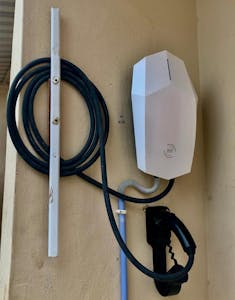Why EV Charging Matters
80% of EV drivers will charge at the convenience of their homes or at work.
Owning an electric vehicle in Nigeria brings unique challenges and opportunities. From the type of plugs available to electricity costs and charging infrastructure, understanding how to charge your EV locally is key to maximizing convenience and savings.
There are three categories of chargers: Trickle Chargers, AC Chargers, and DC Chargers.
- TRICKLE CHARGER (Level 1)
The slowest method of charging your EV at home, using a standard (three-prong) 220V plug.
- AC CHARGER (Level 2)

Having an AC charger installed allows you to charge 5-8 times faster than trickle charging, depending on your EV model, whether you have single-phase or three-phase AC wiring, and the specific charger capacity.
- DC CHARGER

The fastest way to charge your EV at a public DC charging station with power from 50kW and above. With this method, you can top up your battery from 20 to 80% in approximately 40 minutes. Some ultra-fast charging stations already provide more than 200+kW. Your EV ultimately determines your maximum charge rate.
Charging at Home vs Public Stations
Trickle Charging
- Uses the standard three-prong 220V plug supplied with your EV. Simply connect one end to the socket and the other directly to your vehicle.
- No extra equipment or installation is required.
- Provides 13–16 km of driving range per hour of charging.
- Typical charging times: around 65 km in 5 hours (overnight top-up) or 200 km in about 14 hours.
Level 2 Dedicated Home Charger
The most common and recommended home charging solution.
- Uses a 230V outlet, delivering charging speeds 3–4 times faster than trickle charging, depending on your EV model and charger capacity.
- Perfect for overnight charging — for example, a 40 kWh battery can be fully charged in about 6 hours.
- Requires a dedicated wallbox, professionally installed by a qualified electrician.
- Best suited for homes with a garage or driveway, where the wallbox can be safely positioned.
Public Charging
AC Public Charging: Similar to a home AC charger but faster.
DC Fast Charging: The quickest option — can charge 20% to 80% in under 40 minutes.
Cost of Charging in Nigeria
Average electricity tariff: ₦150–₦230 per kWh (depending on electricity band).
Full charge for a 430km, 42kwh battery vehicle using Band A electricity at ₦225 per unit: ₦9,450
Cost per kilometre: ₦9-16
Practical Tips for Nigerian EV Owners
- Battery size matters: bigger battery = more time to charge, but also more range.
- Charging speed of your vehicle: The AC or DC charging rate is determined by the EV’s Battery Control Module (BCM), even if the charger is able to charge faster.
- Cost & incentives: home charger installations may be subsidised; electricity rates vary by location and time of day.
- Battery health: frequent use of very high-speed DC charging can stress batteries more; for day-to-day you might use slower methods.
- Connector availability: especially on long trips; use apps to locate compatible stations ahead of time.



